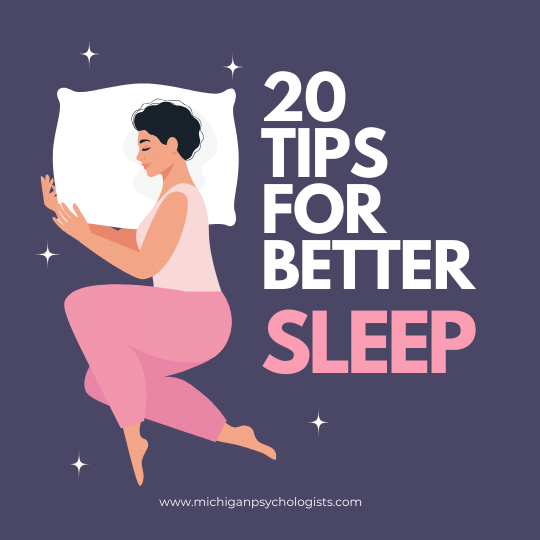20 Tips for Better Sleep

Table of Contents
Struggling with sleepless nights? Discover how a holistic approach to sleep hygiene can transform your rest and alleviate common sleep disorders.
Many people suffer from sleep conditions such as insomnia, sleep apnea, and restless leg syndrome, which can significantly impact overall health and quality of life. Addressing these issues often requires more than just one solution; taking a holistic approach is ideal. By incorporating various tips, such as maintaining a consistent sleep schedule, creating a comfortable sleep environment, and managing diet and exercise, individuals can tackle multiple aspects of their sleep hygiene. This comprehensive strategy enhances the chances of achieving restorative and uninterrupted sleep, ultimately improving overall well-being.
Getting quality sleep is essential for overall health and well-being. Here are 20 tips to help improve your sleep, along with reasons why each is important:
-
Power Down: Reduce exposure to screens and electronic devices before bed. The blue light emitted can disrupt your body’s natural sleep-wake cycle by interfering with melatonin production.
-
Look for Hidden Caffeine: Be aware of hidden sources of caffeine in foods and medications. Caffeine can stay in your system for several hours, making it harder to fall asleep.
-
Save Your Bed for Sleep and Sex: Reserve your bed for sleep and intimate activities only. This helps strengthen the association between your bed and sleep, promoting better rest.
-
Set Your Body Clock: Go to bed and wake up at the same time every day, even on weekends. Consistency reinforces your body’s sleep-wake cycle and can help you fall asleep and wake up more easily.
-
Rethink Your Drink: Avoid alcohol and large meals before bed. Alcohol can disrupt sleep patterns, and heavy meals can cause discomfort and indigestion.
-
Use Caution with Sleeping Pills: Sleeping pills can be a short-term solution but can lead to dependency and side effects. Consult with a healthcare provider for safer alternatives.
-
Watch What Time You Sip: Avoid drinking large amounts of fluids in the evening to reduce the need for nighttime bathroom trips, which can disrupt sleep.
-
Hush Noise: Reduce noise levels in your sleeping environment. Consider using earplugs or a white noise machine to block out disruptive sounds.
-
Skip Naps: Avoid long or irregular naps, especially late in the day. Napping can interfere with nighttime sleep by making it harder to fall asleep at bedtime.
-
Eat Right at Night: Choose light, healthy snacks if you need to eat before bed. Heavy or spicy foods can cause indigestion, which can interfere with sleep.
-
Seal Your Mattress: Use mattress and pillow covers to protect against dust mites and allergens, which can cause sleep-disrupting allergies.
-
Free Your Mind: Practice relaxation techniques like meditation, deep breathing, or journaling before bed. This helps calm your mind and prepare it for sleep.
-
Know When to See Your Doctor: If you have persistent sleep problems, consult a healthcare professional. Sleep disorders like insomnia or sleep apnea may require medical intervention.
-
Beds Are for People: Keep pets out of your bed to avoid disturbances. Pets can move around or make noise, interrupting your sleep.
-
Try a Leg Pillow for Back Pain: Placing a pillow between your legs can help align your hips and reduce back pain, making it easier to sleep comfortably.
-
Lower the Lights: Dim the lights in the evening to signal to your body that it’s time to wind down. Lower light levels help produce melatonin, the hormone that regulates sleep.
-
Turn Down Tobacco: Avoid smoking or using nicotine products close to bedtime. Nicotine is a stimulant and can interfere with falling asleep.
-
Put Your Neck in ‘Neutral’: Use a pillow that supports your neck in a neutral position to prevent neck pain and stiffness, which can disrupt sleep.
-
Block Your Clock: Turn your clock away from your bed. Watching the clock can cause anxiety about not falling asleep, making it harder to do so.
-
Work Out Wisely: Exercise regularly but avoid vigorous activity close to bedtime. Exercise can improve sleep quality, but late-night workouts can be too stimulating.
By incorporating these tips into your daily routine, you can create an environment and habits that promote better sleep, leading to improved overall health and well-being.